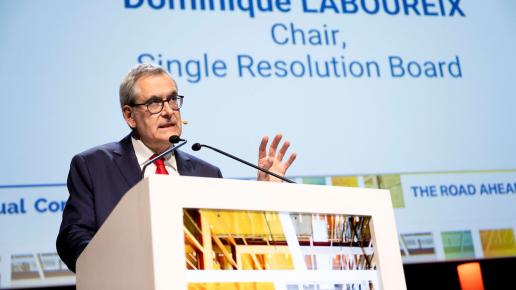The banking turmoil in the US and Switzerland earlier this year had plenty of noteworthy aspects. First Republic Bank, which collapsed shortly after Silicon Valley Bank, was the largest bank to fail since the great financial crisis, while Credit Suisse was the first global systemically important bank to face such a severe crisis since the introduction of a resolution framework. Both US banks and Credit Suisse experienced unprecedented bank runs leading to massive deposit outflows.
Following these events, it is important to reflect on the global and the EU resolution frameworks. These reflections are already taking place at global level. The FSB has embarked on a fact-finding exercise and the Single Resolution Board (SRB) is a key contributor to this exercise. From the SRB perspective, we already drew some initial lessons in particular in three areas - (i) communication and cooperation between authorities; (ii) liquidity; (iii) preparedness to use the resolution tools.
Word travels fast, across borders, in our interconnected world. A hint from a shareholder or the actions by one authority ripple through the global financial system in a frictionless way. Authorities should bear this in mind and deepen their work on communication plans (for themselves and for the banks). To ensure information sharing, international co-operation for internationally systemic banks should be further enhanced, including in cases where a resolution authority is not in a Crisis Management Group (CMG), or where the CMG is not activated/non-existing. The failure of a systemic bank could cause instability even in places where the bank does not operate directly. While it is not possible to envisage all scenarios given the differences of crisis cases, we should however continue the cooperation across the authorities involved, in order to be ready to spring into action where needed.
International cooperation should go together with cooperation between supervisors and resolution authorities. For example, the joint SRB-ECB-EBA press release providing information on the EU hierarchy of liabilities for loss-absorbency helped reestablish calm in the EU AT1 markets after the write down of Credit Suisse’s AT1 instruments on worse terms than shares. More generally, to establish trust, stakeholders should feel that supervision and resolution authorities act seamlessly - as one.
Unsurprisingly, liquidity proved once more to be vital to restore stability. With financial stability in mind, both the Swiss and the American authorities moved swiftly and decisively to provide liquidity. In the EU, the SRB has been working with the banks to improve their ability to identify and mobilise collateral in case of need. Even if banks are very well prepared, we cannot rule out that their liquidity will not be enough in time of crisis. This is especially true considering the sort of rapid bank runs that we have seen in the US and Switzerland. In times of need, our Single Resolution Fund (SRF) stands ready to provide liquidity. The SRF has now reached nearly €80 billion, and its firepower will almost double if the revised ESM Treaty is ratified. Yet, the liquidity needs of a global bank may go even beyond the SRF means. We stand ready to find a solution for these extreme cases. Likely, having a liquidity line in place ex-ante can reduce the needs to actually draw on it.
Finally, resolution tools need to be ready to use. The SRB successfully concluded a sale after writing down and converting shareholders and junior bondholders in the case of Banco Popular in 2017, and sold two subsidiaries of Sberbank last year. In the US and Switzerland, transfers proved to be effective even for larger banks. This, however, does not make bail-in less of a priority. Rather, it shows that we need to be nimble, with backup options in our resolution strategies. We should be able to switch or combine tools to respond effectively to each situation.
Communication and cooperation between authorities, liquidity and preparedness to use resolution tools are not newly discovered issues. These issues were part of the FSB Key Attributes and the EU resolution framework, and the recent cases show that the global and EU framework have stood the test of time. This is why we do not call for a fundamental overhaul of the framework but rather its completion.
For the Banking Union, this means, beyond working on the three issues above, achieving an ambitious and coherent compromise on the ongoing review of the Crisis Management and Deposit Insurance review and making steps towards a common deposit insurance framework.
We do not call for a fundamental overhaul of the EU framework but rather for its completion.
Contact our communications team
Recent interviews

The president of the SRB acknowledges that the fund that led to resolution by the Spanish bank in 2017 has progressed a lot since then and that...

Cypriot banks are on track to meeting their MREL targets, set by the Single Resolution Board (SRB) even well before their deadline, SRB chair...

In the past, some small and middle-sized banks fell between the cracks of the resolution framework. Resolution authorities were not able to resolve...
Related news and press releases

SRB Chair Dominique Laboureix is taking part in the Trilateral Principal Level Exercise (TPLE) in Washington on Saturday, 20 April, joining heads of...

Liquidity is central to successful crisis management. Banks depend on trust. If customers lack confidence that their funds will be available on demand...

The banking turmoil in the US and Switzerland earlier this year had plenty of noteworthy aspects. First Republic Bank, which collapsed shortly after...



